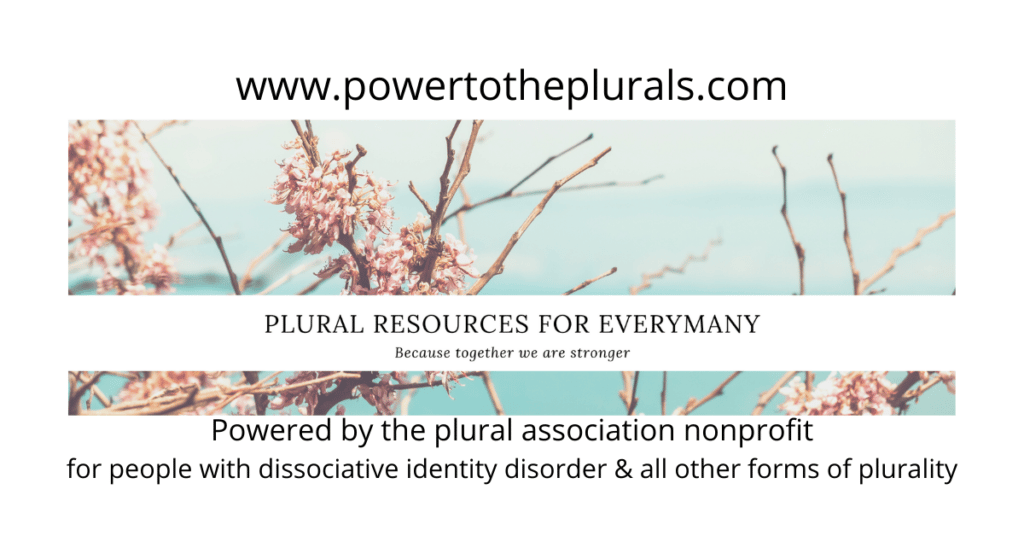|
TPA audio player
|
Today is World Mental Health Day 2019. It’s also a day that is extremely triggering to some (s)RA survivors. It’s a strange combination but also an opportunity for education, advocacy & activism.
Table of Contents
World Mental Health Day:
In the past week and especially today we have seen such beautiful things online. Not only for World Mental Health Day, we also see so many (s)RA survivors and our allies make posts about how this day, month and certain dates can be triggering to certain survivors. We see info posts and warnings for jump scares, for memes about certain dates and holiday trigger warnings. And we see posts from people who do post about the holidays and share things like, please unfollow me and if you need a reminder next month to follow me back, let me know and I will send you a pm.
Absolutely fantastic! We hope our Best practise resource for RA Survivors in DID & Plural safe spaces played a part in this. We want to thank you for your solidarity, support, encouragement, inclusion and respect. We feel heard, accepted and protected.
Join us for World Mental Health Day:
Last year we didn’t really get the chance to focus on World Mental Health Day. But this year, we are choosing to advocate on our & other DID survivors behalves. If you are able to, we invite you to do the same. If need be, you could make a new, separate account just for Plural purposes. (Use a new email and do not give your phone number to stay anonymous. Use a (paid) VPN if you want to be extra secure.)
The biggest myth:
The biggest myth is that Dissociative Identity Disorder (DID) is a rare condition.
It affects 1 to 3% and 12% of the world population in regards to dissociative disorders.
1 to 3% is the same percentage as Borderline Personality Disorder, bipolar disorder and Schizophrenia. Or a totally different example, red hair.
We know that DID is highly underdiagnosed, probably because research shows us that a correct diagnosis for DID takes 6 to 12 years. Probably because the DSM-5 had to add into criteria A that we can self report, in hopes of bringing that time down. Probably because we live in a singular normative world. Probably because of the negative media representation. Probably because of the major lack of funding for both Plurals and for research for the clinical community.
So if you ask us, it’s safe to say that DID diagnosis are rare, but DID itself is quite common.
Now we DID survivors are taking action ourselves.
Whether you have DID, are Plural or an Ally we invite you to help out as well.
Here are some ideas of what you could do for World Mental Health Day:
- Share your personal experience with mental health and/or DID.
- Follow mental health advocates and activists on Twitter.
- Share the infographics at the end of this article.
- Comment on support posts in AlterNation or other mental health support groups.
- Call a friend whom you know struggles with mental health.
- Wear or buy DID Merch or clothing.
- Hold an innerworld support meeting and/or check in with headmates.
- Share Plural life hacks to support other Plurals.
- Tweet with the hashtags listed below.
- Make a donation to Power to the Plurals and/or a mental health organisation.
- Write a support and empowerment letter to yourself & other alters in your journal.
- Share your favorite DID youtube video.
- Make safety reminders or do some expressive art work.
- Our list with what to do on DID Awareness day might give you some ideas.
- Write a poem or song for yourself, headmates or the world.
- Share your favorite DID article.
- Do something nice for self care.
Here is a list of hashtags to use:
#WorldMentalHealthDay
#DissociativeIdentityDisorder
#BreaktheDIDStigma
#PowerToThePlurals
2020 infographics will be uploaded soon!
Feel free to use these images in a non edited form for positive* DID & Plural Acceptance, Education and Awareness.
* These images may not be edited or cropped, do not remove the source (# and website mentions.) Nor may they be used to portray people with DID, Plurals, Plural Events or Power to the Plurals in a negative way by the re-user and/or re-uploader.
The Plural Association NonProfit depends on community support. Please consider donating towards the empowerment of plurals, so we can continue our important work. Donations can be made here: thepluralassociation.org/donate
About the authors
The Stronghold System are the proud volunteer founders & CEO of The Plural Association Nonprofit. They are from the Netherlands and reside in a 30-something-year-old body, are nonbinary, parents of an amazing child & 3 cats. They got diagnosed with Dissociative Identity Disorder over 10 years ago & also self ID as Plural.

